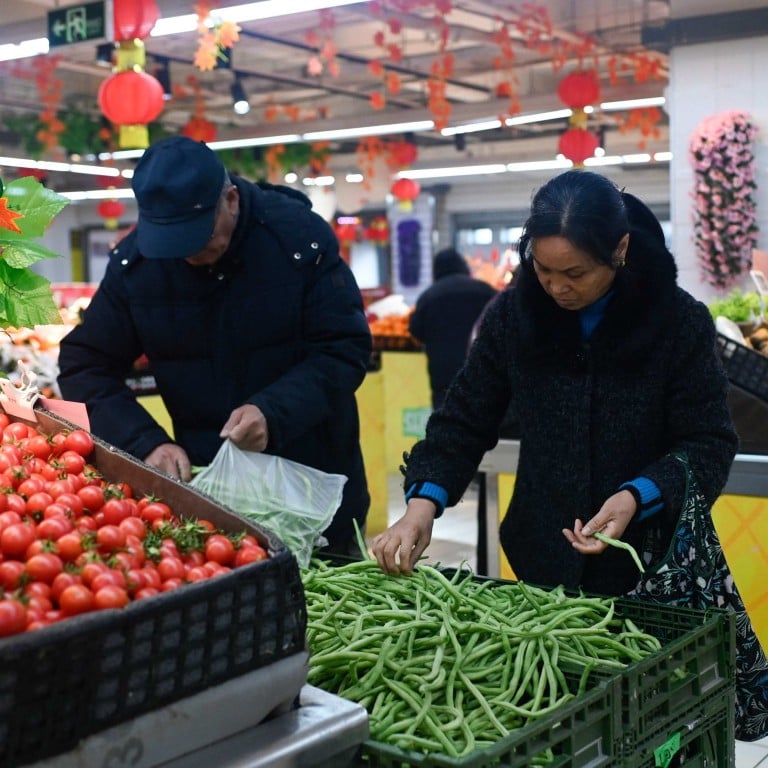
China gets red alert to avoid Japanification as consumer price drops drag inflation to lowest level since 2009
- China’s consumer price index (CPI) fell by 0.3 per cent year on year in December, marking a third consecutive monthly decline amid fears of deflationary risks
- Concerns have risen that China is facing similar issues to Japan’s so-called lost decades of stagnation
China’s falling consumer prices in the fourth quarter have plunged full-year inflation to its lowest level since 2009, adding to calls for more government actions to address deflationary risks and avoid repeating Japan’s so-called lost decades of stagnation.
The producer price index (PPI), which measures costs for goods at the factory gate, fell for the 15th consecutive month in December and dropped by 2.7 per cent year on year, lower than the estimated dip of 2.6 per cent polled by Wind after falling by 3 per cent in the previous month.
Beijing’s policymakers have perceived high inflation as a constant threat, regularly setting a goal of capping annual consumer price growth at 3 per cent over the past decade.
But economists have argued that the mindset has to change as deflation would create more danger for the Chinese economy, especially at the time when confidence is already low and demand has remained weak.
“[Policymakers should realise] deflation will inflict damage as well,” Wang Tao, chief China economist at UBS, told a forum in Shanghai on Monday. “China should pay more attention to deflation.”
The Swiss bank has forecast that China’s CPI would rise by 0.8 per cent in 2024.
“Deflation is completely avoidable as long as China adopts more proactive monetary and fiscal policies and carries forward reform and opening-up,” said Zhu Tian, a professor of economics at the China Europe International Business School in Shanghai.
Beijing is expected to release its inflation and gross domestic product targets, as well as its budget deficit ratio and local bond quota, in the premier’s work report at the National People’s Congress in early March.
China’s negative wage growth in the final quarter of 2023 is a sign that deflationary pressures may become entrenched
Alicia Garcia-Herrero, chief economist for Asia-Pacific at Natixis, said China has shown a similarly large differential between producer and consumer prices like seen in Japan decades ago, and warned that deflation could move into wages and household sectors.
“Japan’s deflation was not just about overcapacity. If there’s no productivity, wages need to come down because there’s no reason to pay workers more if productivity is down,” she said.
“China’s negative wage growth in the final quarter of 2023 is a sign that deflationary pressures may become entrenched.”
Economist calls for China to stimulate activity with controlled inflation rate
China has suffered three periods of consumer price declines in the past 25 years, two of which coincided with financial crises.
The 22-month fall starting from early 1998 was largely a result of Beijing’s monetary tightening to rein in bad loans, coupled with shrinking external demand following the Asian financial crisis.
The deflation threat returned in 2009, when the global financial crisis hit Chinese exporters.
In 2002, the year after China’s accession to the World Trade Organization, there was a brief deflationary period, when the influx of foreign firms improved productivity and reduced costs.
To address the latest concerns, Beijing has unveiled a series of measures since last summer to support the economy.
But the recovery has not yet solidified as China’s property market is still in distress, its private sector is weak, pressures of job creation remain elevated and price indices are stubbornly low.
The government’s efforts to address low inflation and the sluggish economy have, in turn, fuelled market expectations of further policy easing.
Stronger fiscal spending and monetary loosening is widely seen as a way to boost domestic demand when export prospects face uncertainties, while tackling overcapacity would also alleviate pressure on price levels.
This implies more policy rate and reserve requirement ratio cuts to come in the months ahead
Larry Hu, chief China economist at Macquarie, said monetary policy could turn more accommodative in the future.
“[The acknowledgement by the central economic work conference] implies more policy rate and reserve requirement ratio cuts to come in the months ahead,” he said.
Zhu, of the China Europe International Business School, said China’s situation is still a far cry from Japan’s three decades ago. China’s problems, he said, center around a liquidity crunch and the debt woes of developers and local governments, rather than the perilous bubbles seen in Japan.
‘Ups and downs’ ahead for China’s economy despite trade, inflation uptick
“Chinese policymakers should expeditiously solve the debt crisis of developers and local governments to save the economy from deflation,” he said.
Core inflation, which excludes volatile food and energy prices, stood at 0.6 per cent in December and 0.7 per cent for 2023.
Capital Economics said concerns about low inflation may continue to persist, leading policymakers to err in favour of keeping measures supportive in the near-term.
“Over the course of this year, we think that food and energy price deflation will continue to ease, while the ongoing cyclical recovery in economic activity will underpin a slight rise in core inflation,” it said in a research note on Friday.
“That said, weak global growth and continued overinvestment in China means that deflation risks will continue to hang over its economy for some time.”

